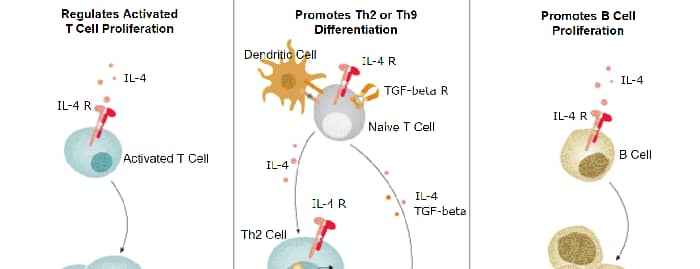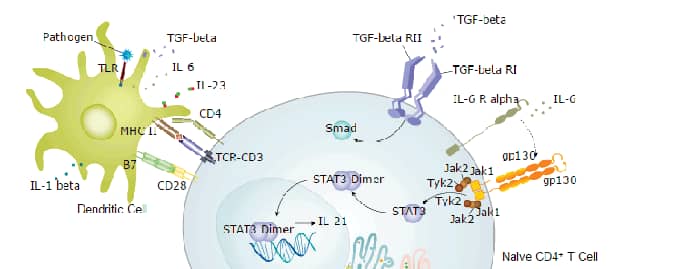Porcine TGF-beta 1 Protein, CF
Discontinued Product
101-B1/CF has been discontinued and is replaced by 7754-BH/CF.
Porcine TGF-beta 1 Protein, CF Summary
Product Specifications
Product Datasheets
Carrier Free
CF stands for Carrier Free (CF). We typically add Bovine Serum Albumin (BSA) as a carrier protein to our recombinant proteins. Adding a carrier protein enhances protein stability, increases shelf-life, and allows the recombinant protein to be stored at a more dilute concentration. The carrier free version does not contain BSA.
In general, we advise purchasing the recombinant protein with BSA for use in cell or tissue culture, or as an ELISA standard. In contrast, the carrier free protein is recommended for applications, in which the presence of BSA could interfere.
101-B1/CF
| Formulation | Lyophilized from a 0.2 μm filtered solution in Acetonitrile and TFA. |
| Reconstitution | Reconstitute 1 µg vials at 10 µg/mL in sterile 4 mM HCl containing at least 0.1% human or bovine serum albumin. Reconstitute 10 µg or larger vials at 100 µg/mL in sterile 4 mM HCl. |
| Shipping | The product is shipped at ambient temperature. Upon receipt, store it immediately at the temperature recommended below. |
| Stability & Storage: | Use a manual defrost freezer and avoid repeated freeze-thaw cycles.
|
Reconstitution Calculator
Background: TGF-beta 1
TGF- beta 1 (transforming growth factor beta 1) is one of three closely related mammalian members of the large TGF-beta superfamily that share a characteristic cystine knot structure (1 - 7). TGF-beta 1, -2 and -3 are highly pleiotropic cytokines that are proposed to act as cellular switches that regulate processes such as immune function, proliferation and epithelial-mesenchymal transition (1 - 4). Each TGF-beta isoform has some non redundant functions; for TGF-beta 1, mice with targeted deletion show defects in hematopoiesis and endothelial differentiation, and die of overwhelming inflammation (2). Porcine TGF-beta 1 cDNA encodes a 390 amino acid (aa) precursor that contains a 29 aa signal peptide and a 361 aa proprotein (8). A furin-like convertase processes the proprotein to generate an N-terminal 220 aa latency-associated peptide (LAP) and a C-terminal 112 aa mature TGF- beta 1 (8, 9). Disulfide-linked homodimers of LAP and TGF-beta 1 remain non-covalently associated after secretion, forming the small latent TGF-beta 1 complex (8 - 10). Covalent linkage of LAP to one of three latent TGF-beta binding proteins (LTBPs) creates a large latent complex that may interact with the extracellular matrix (9, 10). TGF-beta is activated from latency by pathways that include actions of the protease plasmin, matrix metalloproteases, thrombospondin 1 and a subset of integrins (10). Mature porcine TGF-beta 1 shows 100% aa identity with human, dog and cow TGF-beta 1 and 99% aa identity with mouse, rat and horse TGF-beta 1. It demonstrates cross species activity (1). TGF-beta 1 signaling begins with high-affinity binding to a type II ser/thr kinase receptor termed TGF-beta RII. This receptor then phosphorylates and activates a second ser/thr kinase receptor, TGF-beta RI (also called activin receptor-like kinase (ALK) -5), or alternatively, ALK-1.This complex phosphorylates and activates Smad proteins that regulate transcription (3, 11, 12). Contributions of the accessory receptors betaglycan (also known as TGF-beta RIII) and endoglin, or use of Smad-independent signaling pathways, allow for disparate actions observed in response to TGF-beta in different contexts (11).
- Sporn, M.B. (2006) Cytokine Growth Factor Rev. 17:3.
- Dunker, N. and K. Krieglstein (2000) Eur. J. Biochem. 267:6982.
- Wahl, S.M. (2006) Immunol. Rev. 213:213.
- Chang, H. et al. (2002) Endocr. Rev. 23:787.
- Lin, J.S. et al. (2006) Reproduction 132:179.
- Hinck, A.P. et al. (1996) Biochemistry 35:8517.
- Mittl, P.R.E. et al. (1996) Protein Sci. 5:1261.
- Kondaiah, P. et al. (1988) J. Biol. Chem. 263:18313.
- Miyazono, K. et al. (1988) J. Biol. Chem. 263:6407.
- Oklu, R. and R. Hesketh (2000) Biochem. J. 352:601.
- De Caestecker, M. et al. (2004) Cytokine Growth Factor Rev. 15:1.
- Zuniga, J.E. et al. (2005) J. Mol. Biol. 354:1052.v. 15:1.
Citations for Porcine TGF-beta 1 Protein, CF
R&D Systems personnel manually curate a database that contains references using R&D Systems products. The data collected includes not only links to publications in PubMed, but also provides information about sample types, species, and experimental conditions.
22
Citations: Showing 1 - 10
Filter your results:
Filter by:
-
Angiotensin-II-Evoked Ca2+ Entry in Murine Cardiac Fibroblasts Does Not Depend on TRPC Channels
Authors: JE Camacho Lo, A Marx, AE Kraft, A Schürger, C Richter, A Dietrich, P Lipp, L Birnbaumer, M Freichel
Cells, 2020-01-29;9(2):.
Species: Mouse
Sample Types: Whole Cells
Applications: Bioassay -
Regulation of fibroblast Fas expression by soluble and mechanical pro-fibrotic stimuli
Authors: AE Dodi, IO Ajayi, C Chang, M Beard, SL Ashley, SK Huang, VJ Thannickal, DJ Tschumperl, TH Sisson, JC Horowitz
Respir. Res., 2018-05-10;19(1):91.
Species: Human
Sample Types: Whole Cells
Applications: Bioassay -
Specialized fibroblast differentiated states underlie scar formation in the infarcted mouse heart
Authors: X Fu, H Khalil, O Kanisicak, JG Boyer, RJ Vagnozzi, BD Maliken, MA Sargent, V Prasad, I Valiente-A, BC Blaxall, JD Molkentin
J. Clin. Invest., 2018-04-16;0(0):.
Species: Mouse
Sample Types: Whole Cells
Applications: Bioassay -
CD96 expression determines the inflammatory potential of IL-9-producing Th9 cells
Authors: K Stanko, C Iwert, C Appelt, K Vogt, J Schumann, FJ Strunk, S Ahrlich, S Schlickeis, C Romagnani, K Jürchott, C Meisel, G Willimsky, AA Kühl, B Sawitzki
Proc. Natl. Acad. Sci. U.S.A., 2018-03-12;0(0):.
Species: Human
Sample Types: Whole Cells
Applications: Bioassay -
SMAD4 feedback regulates the canonical TGF-? signaling pathway to control granulosa cell apoptosis
Authors: X Du, Z Pan, Q Li, H Liu, Q Li
Cell Death Dis, 2018-02-02;9(2):151.
Species: Porcine
Sample Types: Whole Cells
Applications: Bioassay -
Diverse functions of clusterin promote and protect against the development of pulmonary fibrosis
Authors: L Peix, IC Evans, DR Pearce, JK Simpson, TM Maher, RJ McAnulty
Sci Rep, 2018-01-30;8(1):1906.
Species: Human
Sample Types: Whole Cells
Applications: Bioassay -
Glutaminolysis is required for TGF-?1-induced myofibroblast differentiation and activation
Authors: K Bernard, NJ Logsdon, GA Benavides, Y Sanders, J Zhang, VM Darley-Usm, VJ Thannickal
J. Biol. Chem., 2017-12-08;0(0):.
Species: Human
Sample Types: Whole Cells
Applications: Bioassay -
Fibroblast-specific TGF-?-Smad2/3 signaling underlies cardiac fibrosis
Authors: H Khalil, O Kanisicak, V Prasad, RN Correll, X Fu, T Schips, RJ Vagnozzi, R Liu, T Huynh, SJ Lee, J Karch, JD Molkentin
J. Clin. Invest., 2017-09-11;0(0):.
Species: Mouse
Sample Types: Whole Cells
Applications: Bioassay -
Low doses of cholera toxin and its mediator cAMP induce CTLA-2 secretion by dendritic cells to enhance regulatory T cell conversion
Authors: C Silva-Vilc, K Pletinckx, M Lohnert, V Pavlovic, D Ashour, V John, E Vendelova, S Kneitz, J Zhou, R Chen, T Reinheckel, TD Mueller, J Bodem, MB Lutz
PLoS ONE, 2017-07-31;12(7):e0178114.
Species: Mouse
Sample Types: Whole Cells
Applications: Bioassay -
TGF-? signaling controls FSHR signaling-reduced ovarian granulosa cell apoptosis through the SMAD4/miR-143 axis
Cell Death Dis, 2016-11-24;7(11):e2476.
Species: Porcine
Sample Types: Whole Cells
Applications: Bioassay -
Context-dependent switch in chemo/mechanotransduction via multilevel crosstalk among cytoskeleton-regulated MRTF and TAZ and TGF?-regulated Smad3
Nat Commun, 2016-05-18;7(0):11642.
Species: Porcine
Sample Types: Whole Cells
Applications: Bioassay -
Serotonin 2B Receptor Antagonism Prevents Heritable Pulmonary Arterial Hypertension.
Authors: West J, Carrier E, Bloodworth N, Schroer A, Chen P, Ryzhova L, Gladson S, Shay S, Hutcheson J, Merryman W
PLoS ONE, 2016-02-10;11(2):e0148657.
Species: Mouse
Sample Types: Whole Cells
Applications: Bioassay -
Metabolic Reprogramming Is Required for Myofibroblast Contractility and Differentiation.
Authors: Bernard K, Logsdon N, Ravi S, Xie N, Persons B, Rangarajan S, Zmijewski J, Mitra K, Liu G, Darley-Usmar V, Thannickal V
J Biol Chem, 2015-08-28;290(42):25427-38.
Species: Human
Sample Types: Whole Cells
Applications: Bioassay -
IkappaBNS regulates murine Th17 differentiation during gut inflammation and infection.
Authors: Annemann M, Wang Z, Plaza-Sirvent C, Glauben R, Schuster M, Ewald Sander F, Mamareli P, Kuhl A, Siegmund B, Lochner M, Schmitz I
J Immunol, 2015-02-18;194(6):2888-98.
Species: Mouse
Sample Types: Whole Cells
Applications: Bioassay -
SMAD-independent down-regulation of caveolin-1 by TGF-beta: effects on proliferation and survival of myofibroblasts.
Authors: Sanders Y, Cui Z, Le Saux C, Horowitz J, Rangarajan S, Kurundkar A, Antony V, Thannickal V
PLoS ONE, 2015-02-06;10(2):e0116995.
Species: Human
Sample Types: Whole Cells
Applications: Bioassay -
RGD surface functionalization of the hydrophilic acrylic intraocular lens material to control posterior capsular opacification.
Authors: Huang Y, Bertrand V, Bozukova D, Pagnoulle C, Labrugere C, De Pauw E, De Pauw-Gillet M, Durrieu M
PLoS ONE, 2014-12-11;9(12):e114973.
Species: Porcine
Sample Types: Whole Cells
Applications: Bioassay -
Tc17, a unique subset of CD8 T cells that can protect against lethal influenza challenge.
Authors: Hamada H, Garcia-Hernandez Mde L, Reome JB, Misra SK, Strutt TM, McKinstry KK, Cooper AM, Swain SL, Dutton RW
J. Immunol., 2009-03-15;182(6):3469-81.
Species: Mouse
Sample Types: Whole Cells
Applications: Bioassay -
TH17 cells mediate steroid-resistant airway inflammation and airway hyperresponsiveness in mice.
Authors: McKinley L, Alcorn JF, Peterson A, Dupont RB, Kapadia S, Logar A, Henry A, Irvin CG, Piganelli JD, Ray A, Kolls JK
J. Immunol., 2008-09-15;181(6):4089-97.
Species: Mouse
Sample Types: Whole Cells
Applications: Bioassay -
The aberrant methylation of TSP1 suppresses TGF-beta1 activation in colorectal cancer.
Authors: Rojas A, Meherem S, Kim YH, Washington MK, Willis JE, Markowitz SD, Grady WM
Int. J. Cancer, 2008-07-01;123(1):14-21.
Species: Human
Sample Types: Recombinant Protein
Applications: Bioassay -
3-Phosphoinositide-dependent PDK1 negatively regulates transforming growth factor-beta-induced signaling in a kinase-dependent manner through physical interaction with Smad proteins.
Authors: Seong HA, Jung H, Kim KT, Ha H
J. Biol. Chem., 2007-02-27;282(16):12272-89.
Species: Human
Sample Types: Whole Cells
Applications: Bioassay -
Transforming growth factor beta1 regulates follistatin mRNA expression during in vitro bovine granulosa cell differentiation.
Authors: Fazzini M, Vallejo G, Colman-Lerner A, Trigo R, Campo S, Baranao JL, Saragueta PE
J. Cell. Physiol., 2006-04-01;207(1):40-8.
Species: Bovine
Sample Types: Whole Cells
Applications: Bioassay -
Xenopus neurula left-right asymmetry is respeficied by microinjecting TGF-beta5 protein.
Authors: Mogi K, Goto M, Ohno E, Azumi Y, Takeuchi S, Toyoizumi R
Int. J. Dev. Biol., 2003-02-01;47(1):15-29.
Species: Xenopus
Sample Types: In Vivo
Applications: In Vivo
FAQs
No product specific FAQs exist for this product, however you may
View all Proteins and Enzyme FAQsReviews for Porcine TGF-beta 1 Protein, CF
There are currently no reviews for this product. Be the first to review Porcine TGF-beta 1 Protein, CF and earn rewards!
Have you used Porcine TGF-beta 1 Protein, CF?
Submit a review and receive an Amazon gift card.
$25/€18/£15/$25CAN/¥75 Yuan/¥2500 Yen for a review with an image
$10/€7/£6/$10 CAD/¥70 Yuan/¥1110 Yen for a review without an image









